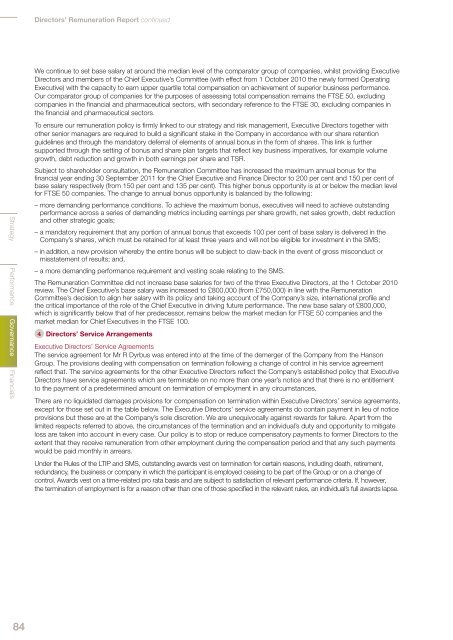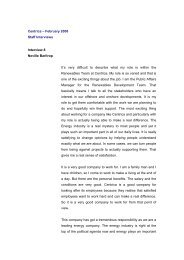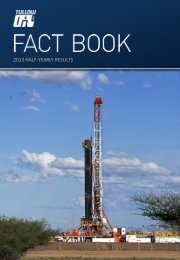Annual report 2010 - Imperial Tobacco Group
Annual report 2010 - Imperial Tobacco Group
Annual report 2010 - Imperial Tobacco Group
Create successful ePaper yourself
Turn your PDF publications into a flip-book with our unique Google optimized e-Paper software.
Directors’ Remuneration Report continuedStrategy Performance Governance FinancialsWe continue to set base salary at around the median level of the comparator group of companies, whilst providing ExecutiveDirectors and members of the Chief Executive’s Committee (with effect from 1 October <strong>2010</strong> the newly formed OperatingExecutive) with the capacity to earn upper quartile total compensation on achievement of superior business performance.Our comparator group of companies for the purposes of assessing total compensation remains the FTSE 50, excludingcompanies in the financial and pharmaceutical sectors, with secondary reference to the FTSE 30, excluding companies inthe financial and pharmaceutical sectors.To ensure our remuneration policy is firmly linked to our strategy and risk management, Executive Directors together withother senior managers are required to build a significant stake in the Company in accordance with our share retentionguidelines and through the mandatory deferral of elements of annual bonus in the form of shares. This link is furthersupported through the setting of bonus and share plan targets that reflect key business imperatives, for example volumegrowth, debt reduction and growth in both earnings per share and TSR.Subject to shareholder consultation, the Remuneration Committee has increased the maximum annual bonus for thefinancial year ending 30 September 2011 for the Chief Executive and Finance Director to 200 per cent and 150 per cent ofbase salary respectively (from 150 per cent and 135 per cent). This higher bonus opportunity is at or below the median levelfor FTSE 50 companies. The change to annual bonus opportunity is balanced by the following:– more demanding performance conditions. To achieve the maximum bonus, executives will need to achieve outstandingperformance across a series of demanding metrics including earnings per share growth, net sales growth, debt reductionand other strategic goals;– a mandatory requirement that any portion of annual bonus that exceeds 100 per cent of base salary is delivered in theCompany’s shares, which must be retained for at least three years and will not be eligible for investment in the SMS;– in addition, a new provision whereby the entire bonus will be subject to claw-back in the event of gross misconduct ormisstatement of results; and,– a more demanding performance requirement and vesting scale relating to the SMS.The Remuneration Committee did not increase base salaries for two of the three Executive Directors, at the 1 October <strong>2010</strong>review. The Chief Executive’s base salary was increased to £800,000 (from £750,000) in line with the RemunerationCommittee’s decision to align her salary with its policy and taking account of the Company’s size, international profile andthe critical importance of the role of the Chief Executive in driving future performance. The new base salary of £800,000,which is significantly below that of her predecessor, remains below the market median for FTSE 50 companies and themarket median for Chief Executives in the FTSE 100.4 Directors’ Service ArrangementsExecutive Directors’ Service AgreementsThe service agreement for Mr R Dyrbus was entered into at the time of the demerger of the Company from the Hanson<strong>Group</strong>. The provisions dealing with compensation on termination following a change of control in his service agreementreflect that. The service agreements for the other Executive Directors reflect the Company’s established policy that ExecutiveDirectors have service agreements which are terminable on no more than one year’s notice and that there is no entitlementto the payment of a predetermined amount on termination of employment in any circumstances.There are no liquidated damages provisions for compensation on termination within Executive Directors’ service agreements,except for those set out in the table below. The Executive Directors’ service agreements do contain payment in lieu of noticeprovisions but these are at the Company’s sole discretion. We are unequivocally against rewards for failure. Apart from thelimited respects referred to above, the circumstances of the termination and an individual’s duty and opportunity to mitigateloss are taken into account in every case. Our policy is to stop or reduce compensatory payments to former Directors to theextent that they receive remuneration from other employment during the compensation period and that any such paymentswould be paid monthly in arrears.Under the Rules of the LTIP and SMS, outstanding awards vest on termination for certain reasons, including death, retirement,redundancy, the business or company in which the participant is employed ceasing to be part of the <strong>Group</strong> or on a change ofcontrol. Awards vest on a time-related pro rata basis and are subject to satisfaction of relevant performance criteria. If, however,the termination of employment is for a reason other than one of those specified in the relevant rules, an individual’s full awards lapse.84
















